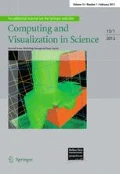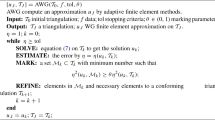Abstract
In this article we develop a convergence theory for goal-oriented adaptive finite element algorithms designed for a class of second-order semilinear elliptic equations. We briefly discuss the target problem class, and introduce several related approximate dual problems that are crucial to both the analysis as well as to the development of a practical numerical method. We then review some standard facts concerning conforming finite element discretization and error-estimate-driven adaptive finite element methods (AFEM). We include a brief summary of a priori estimates for this class of semilinear problems, and then describe some goal-oriented variations of the standard approach to AFEM. Following the recent approach of Mommer–Stevenson and Holst–Pollock for increasingly general linear problems, we first establish a quasi-error contraction result for the primal problem. We then develop some additional estimates that make it possible to establish contraction of the combined primal-dual quasi-error, and subsequently show convergence with respect to the quantity of interest. Finally, a sequence of numerical experiments are examined and it is observed that the behavior of the implementation follows the predictions of the theory.




Similar content being viewed by others
References
Axelsson, O., Barker, V.A.: Finite Element Solution of Boundary Value Problems: Theory and Computation. Society for Industrial and Applied Mathematics, Philadelphia, PA (2001)
Bangerth, W., Rannacher, R.: Adaptive Finite Element Methods for Differential Equations. Birkhauser, Boston (2003)
Bank, R., Holst, M., Szypowski, R., Zhu, Y.: Finite Element Error Estimates for Critical Growth Semilinear Problems Without Angle Conditions (2011) Available as arXiv:1108.3661 [math.NA]. Submitted
Becker, R., Rannacher, R.: A feed-back approach to error control in finite element methods: basic analysis and examples. East-West J. Numer. Math. 4, 237–264 (1996)
Becker, R., Rannacher, R.: Weighted a posteriori error control in FE methods. Preprint 96-1, SFB 359, Universitat, pp. 18–22 (1996)
Becker, R., Rannacher, R.: An optimal control approach to a posteriori error estimation in finite element methods. In: Iserles, A. (ed.) Acta Numer, pp. 1–0102. Cambridge University Press, Cambridge (2001)
Binev, P., Dahmen, W., DeVore, R.: Adaptive finite element methods with convergence rates. Numer. Math. 97(2), 219–268 (2004)
Brenner, S., Scott, L.: The Mathematical Theory of Finite Element Methods, 3rd edn. Springer, Berlin (2008)
Cascon, J.M., Kreuzer, C., Nochetto, R.H., Siebert, K.G.: Quasi-optimal convergence rate for an adaptive finite element method. SIAM J. Numer. Anal. 46(5), 2524–2550 (2008)
Ciarlet, P.G.: Finite Element Method for Elliptic Problems. Society for Industrial and Applied Mathematics, Philadelphia, PA (2002)
Dahmen, W., Kunoth, A., Vorloeper, J.: Convergence of Adaptive Wavelet Methods for Goal-oriented Error Estimation. Sonderforschungsbereich 611, Singuläre Phänomene und Skalierung in Mathematischen Modellen. SFB 611 (2006)
Dörfler, W.: A convergent adaptive algorithm for Poisson’s equation. SIAM J. Numer. Anal. 33, 1106–1124 (1996)
Eriksson, K., Estep, D., Hansbo, P., Johnson, C.: Introduction to adaptive methods for differential equations. In: Iserles, A. (ed.) Acta Numer, pp. 105–158. Cambridge University Press, Cambridge (1995)
Estep, D., Holst, M., Larson, M.: Generalized green’s functions and the effective domain of influence. SIAM J. Sci. Comput. 26, 1314–1339 (2002)
Estep, D., Holst, M., Mikulencak, D.: Accounting for stability: a posteriori error estimates based on residuals and variational analysis. In: Communications in Numerical Methods in Engineering, pp. 200–202 (2001)
Estep, D., Larson, M.G., Williams, R.D.: Estimating the error of numerical solutions of systems of reaction-diffusion equations. Mem. Am. Math. Soc. 146(696), 101–109 (2000)
Evans, L.C.: Partial Differential Equations (Graduate Studies in Mathematics, V. 19) GSM/19. American Mathematical Society, New York (1998)
Gilbarg, D., Trudinger, N.S.: Elliptic Partial Differential Equations of Second Order. Springer, Berlin (1977)
Giles, M., Süli, E.: Adjoint methods for PDEs: a posteriori error analysis and postprocessing by duality. Acta Numer. 11, 145–236 (2003)
Grätsch, T., Bathe, K.-J.: A posteriori error estimation techniques in practical finite element analysis. Comput. Struct. 83(4–5), 235–265 (2005)
Holst, M.: Adaptive numerical treatment of elliptic systems on manifolds. Adv. Comput. Math. 15(1–4), 139–191 (2001) Available as arXiv:1001.1367 [math.NA]
Holst, M.: Applications of domain decomposition and partition of unity methods in physics and geometry. In: Herrera, I., Keyes, D., Widlund, O., Yates, R. (eds.) Proceedings of the Fourteenth International Conference on Domain Decomposition Methods, pp. 63–78. National Autonomous University of Mexico (UNAM) (2003) Available arXiv:1001.1364 [math.NA]
Holst, M., McCammon, J., Yu, Z., Zhou, Y., Zhu, Y.: Adaptive finite element modeling techniques for the Poisson-Boltzmann equation. Commun. Comput. Phys. 11(1), 179–214 (2012) Available arXiv:1009.6034 [math.NA]
Holst, M., Pollock, S.: Convergence of goal oriented methods for nonsymmetric problems . Numer Methods Partial Differ. Equ. (2015) Available as arXiv:1108.3660 [math.NA]
Holst, M., Szypowski, R., Zhu, Y.: Adaptive finite element methods with inexact solvers for the nonlinear poisson-boltzmann equation. In: Bank, R., Holst, M., Widlund, O., Xu, J. (eds.) Domain Decomposition Methods in Science and Engineering XX, volume 91 of Lecture Notes in Computational Science and Engineering, pp. 167–174. Springer, Berlin (2013)
Holst, M., Szypowski, R., Zhu, Y.: Two-grid methods for semilinear interface problems. Numer Methods Partial Differ. Equ. 29(5), 1729–1748 (2013)
Holst, M., Tsogtgerel, G., Zhu, Y.: Local and global convergence of adaptive methods for nonlinear partial differential equations (2008) Available as arXiv:1001.1382 [math.NA]
Jüngel, A., Unterreiter, A.: Discrete minimum and maximum principles for finite element approximations of non-monotone elliptic equations. Numer. Math. 99(3), 485–508 (2005)
Karatson, J., Korotov, S.: Discrete maximum principles for finite element solutions of nonlinear elliptic problems with mixed boundary conditions. Numer. Math. 99, 669–698 (2005)
Kerkhoven, T., Jerome, J.W.: \(L_{\infty }\) stability of finite element approximations of elliptic gradient equations. Numer. Math. 57, 561–575 (1990)
Kesavan, S.: Topics in Functional Analysis and Applications. Wiley, New York, NY (1989)
Korotov, S.: A posteriori error estimation of goal-oriented quantities for elliptic type bvps. J. Comput. Appl. Math. 191(2), 216–227 (2006)
Mekchay, K., Nochetto, R.: Convergence of adaptive finite element methods for general second order linear elliptic PDE. SINUM 43(5), 1803–1827 (2005)
Mommer, M.S., Stevenson, R.: A goal-oriented adaptive finite element method with convergence rates. SIAM J. Numer. Anal. 47(2), 861–886 (2009)
Moon, K.-S., von Schwerin, E., Szepessy, A., Tempone, R.: Convergence rates for an adaptive dual weighted residual finite element algorithm. BIT 46(2), 367–407 (2006)
Nochetto, R.H., Siebert, K.G., Veeser, A.: Theory of Adaptive Finite Element Methods: An Introduction. Springer, Berlin (2009)
Oden, J., Prudhomme, S.: Goal-oriented error estimation and adaptivity for the finite element method. Comput. Math. Appl. 41, 735–756 (2001)
Sewell, E.G.: Automatic generation of triangulations for piecewise polynomial approximation. Ph. D. dissertation. Purdue Univ., West Lafayette, IN (1972)
Strang, G., Fix, G.J.: An Analysis of the Finite Element Method. Prentice-Hall (Series in Automatic Computation), Englewood Cliffs, NJ (1973)
Struwe, M.: Variational Methods, 3rd edn. Springer, Berlin (2000)
Verfürth, R.: A posteriori error estimates for nonlinear problems. Finite element discretizations of elliptic equations. Math. Comput. 62(206), 445–475 (1994)
Verfürth, R.: A review of a posteriori error estimation and adaptive mesh refinement tecniques. Teubner–Wiley, Stuttgart (1996)
Acknowledgments
MH was supported in part by NSF Awards 1065972, 1217175, 1262982, 1318480, and by AFOSR Award FA9550-12-1-0046. SP and YZ were supported in part by NSF Awards 1065972 and 1217175. YZ was also supported in part by NSF DMS 1319110, and in part by University Research Committee Grant No. F119 at Idaho State University, Pocatello, Idaho.
Author information
Authors and Affiliations
Corresponding author
Additional information
Communicated by Gabriel Wittum.
Rights and permissions
About this article
Cite this article
Holst, M., Pollock, S. & Zhu, Y. Convergence of goal-oriented adaptive finite element methods for semilinear problems. Comput. Visual Sci. 17, 43–63 (2015). https://doi.org/10.1007/s00791-015-0243-1
Received:
Accepted:
Published:
Issue Date:
DOI: https://doi.org/10.1007/s00791-015-0243-1
Keywords
- Adaptive finite element methods
- Goal oriented
- Semilinear elliptic problems
- Quasi-orthogonality
- Residual-based error estimator
- Convergence
- Contraction
- A posteriori estimates




